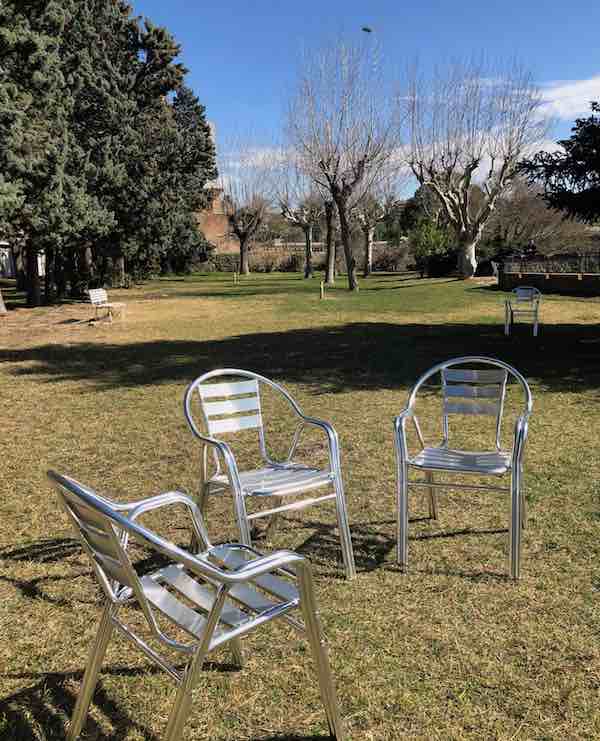
Spiritual Direction is a unique service, which is a vital part of one's spiritual formation. The focus is not on projects, activities and numbers of students. Rather, Spiritual Direction is about presence and availability to students. The emphasis is on one-to-one contact. For each student affected positively through Spiritual Direction, several others are usually impacted by that student's attitude and spirituality. Direction impacts a person's sense of purpose, meaning in life, faith and trust stance, and self-esteem. This ministry of compassionate presence, through deep non-judgmental listening, provides the recipient with a sense of personal affirmation and dignity, acceptance in one's diversity, challenge to growth, and encouragement in faith. We welcome students of all faiths. By honoring the dignity and uniqueness of each person and the sacredness of each one's journey, we invite students into healthy living, into wholeness and holiness, into being their best selves. In this way, Loyola Marymount can help to shape individuals with character and compassion who serve and lead our complex world.
What happens in a Spiritual Direction session?
Often the session will begin with a few minutes of prayer or silence. Generally, the director listens in an open, prayerful environment to the directee's sharing about what is going on in his/her life. The time together fosters awareness of anything that is occurring in the person's life which has helped or hindered his/her relationship with God. The director acts as a supportive companion who allows the seeker/directee to look honestly at his/her relationship with God as it is lived out in everyday life and relationships. The emphasis is on affirmation of God's mysterious presence in our ordinary lives. The guidance of the Holy Spirit is what is most deeply sought in each session. Sessions are generally fifty minutes long and occur in varying frequency.
What is the difference between Spiritual Direction and Counseling?
Counseling is often concerned with social adjustment and therapeutic management of life's problems, whereas Spiritual Direction focuses on the person's deepening relationship with the Sacred. Spiritual Direction assumes both a faith perspective and a fundamental desire for prayer and intimacy with God. Since they each have a different focus, some people choose to participate in both forms of guidance, but usually in separate contexts.
Spiritual Director
The director helps the student by providing a loving and open environment, by being a listener and companion, and by giving support and feedback. Students are helped to clarify, articulate and affirm their spiritual experience as revealed through the situations and events in their lives. Spiritual Direction encourages individuals to make life decisions in response to their growing awareness of God's presence in their lives. By being available on campus and present at various activities and liturgies, the Spiritual Director contacts students who are searching for a more conscious relationship with God. Some one-on-one meetings are scheduled regularly, while others happen spontaneously. The act of slowing down enough, to allow contemplative listening to one another, helps us to recognize God in all persons and circumstances of our lives. Quality of presence can often have greater impact than quantity, but it requires reflection, openness, time availability, understanding and support.
Most of our Campus Ministers are also available as Spiritual Directors for a limited number of students, as are some of our Resident Ministers. Some of the religious and clergy on campus (and in the neighborhood) are also available when needed or requested.
If you are a student interested in spiritual direction, please contact Sr. Maria Lai, CSJ at 310.338.6475 or maria.lai@lmu.edu for more information.
Advice from Directees
“I’d say it helps my life and gave me the gift of God that I had previously overlooked. It showed me how much God loves me, as my spiritual director would often say: ‘God is madly in love with you.’ That idea was the first time I truly realized how loved I am by God, and it gave me the breakthrough I needed to finally feel enough in this world.”
-Amy Felix, 2025
If a friend asked me about spiritual direction, “I would say it’s one of the biggest reasons I’m still here today. I’ve struggled for years, and during that time I tried everything—therapy, self-care, medication—you name it. But there was always something missing, and that was God. He had been waiting for me all along. Our Father never turns His face away from us, but sometimes we drift. Coming back isn’t always easy. Even though I was raised Catholic and grew up in the Church, I still needed guidance. And that’s what spiritual direction gave me. I can now honestly say that I am happy to be alive.
That doesn’t mean everything is perfect—I still have moments of anxiety and depression—but if I compare where I am now to where I used to be, I’m incredibly proud of how far I’ve come. I’ve grown so much, and it’s proof that healing is possible. You are not alone. Spiritual direction helps you learn about yourself, about Christ, and about why we owe Him our thanks. Nothing is a coincidence when it comes to God. So, if you are even thinking about joining, take that as your sign—do it! God is waiting for you.”
-Grace Alcedo, 2025
“It is so important because it challenges you to recognize how God is always present in everything you do.”
-Anonymous
“It could be life-changing, and I encourage everybody to at least try one session.”
-Anonymous
“All souls who wish to reach God need to have a spiritual guide, and even more so those souls who guide others.”
-Arely, Consecrated Woman